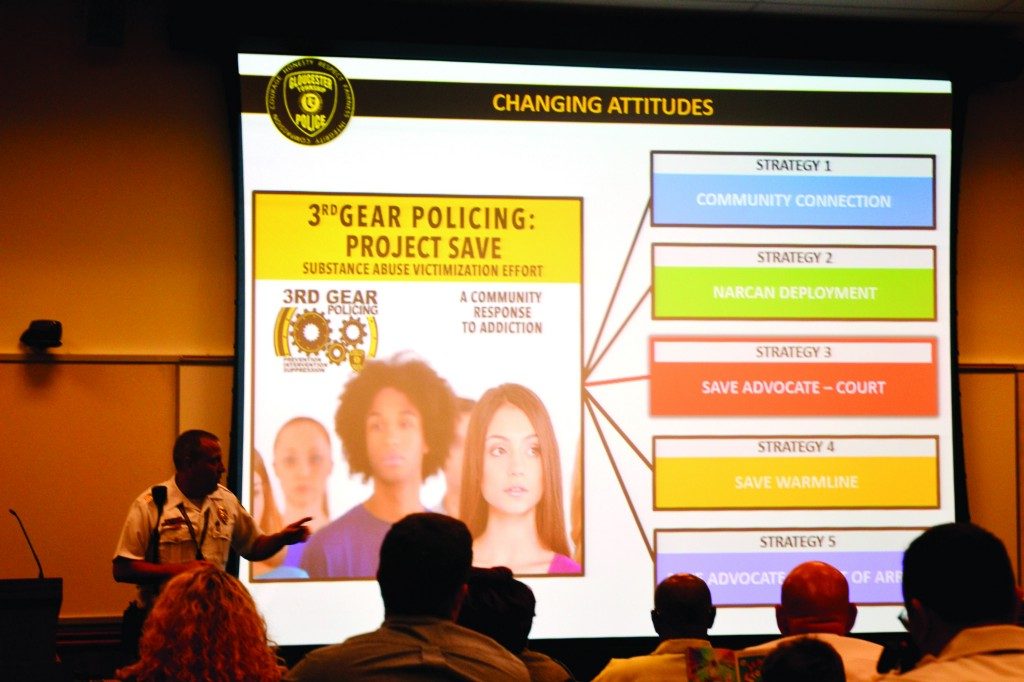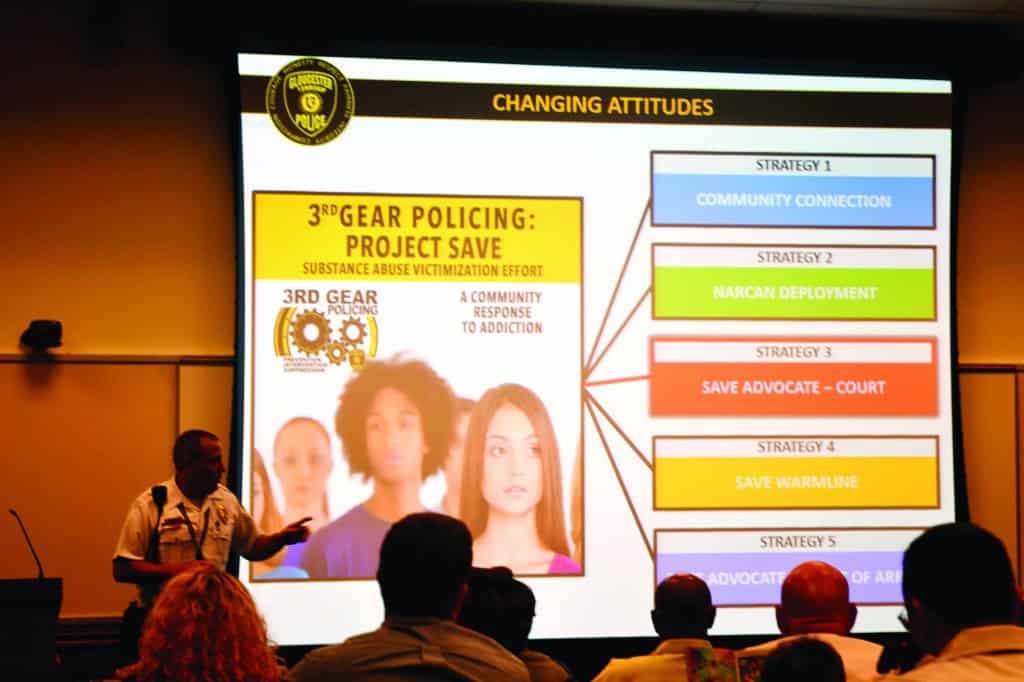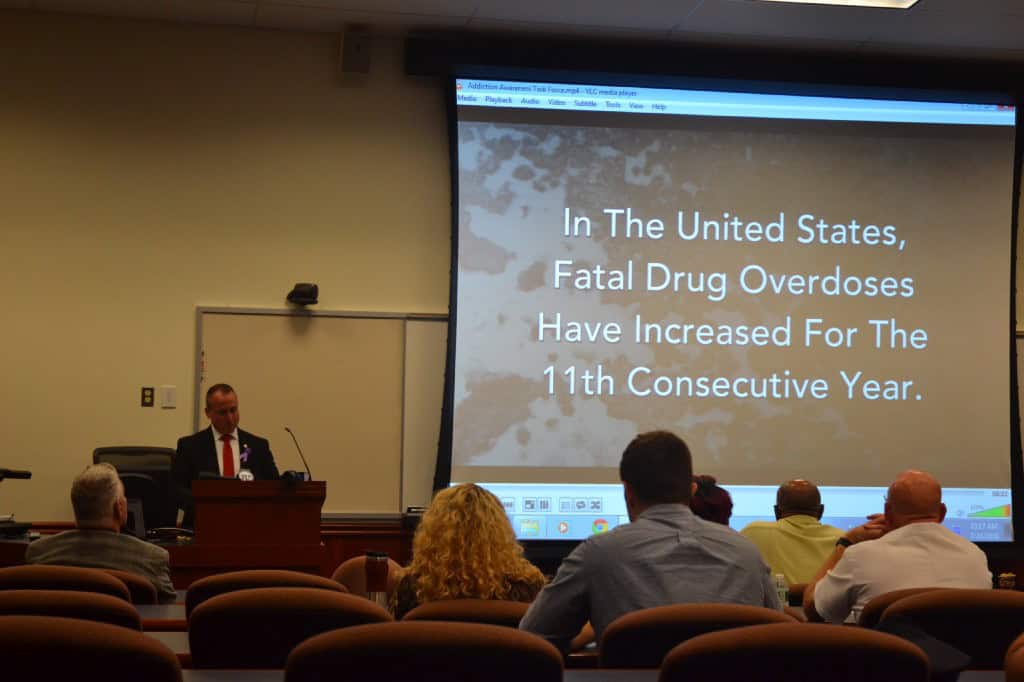
GTPD present their latest efforts to combat addiction

The language surrounding drug addiction is changing.
According to the Camden County Prosecutor’s Office, in the United States, fatal drug overdoses have increased for the 11th consecutive year.
That fact was read by a group of people gathered at the Camden County Regional Emergency Training Center in Gloucester Township on Tuesday, July 24.
State and local elected officials and members of law enforcement along with representatives of the Camden County Prosecutor’s Office, members of U.S. Department of Justice and more were present in Gloucester Township as part of the 21 County, 21st Century Community Policing Project, or 21/21 Project.
In April, Attorney General Gurbir S. Grewal announced the 21/21 Project as an initiative aimed at building the relationship between law enforcement and community.
Required to host four meetings a year, all county prosecutors’ offices are permitted to hold town halls, roundtable discussions, presentations or a similar events to address issues that affect all members of a community.
The topic of July’s Camden County discussion focused on opioids.
“Let me share some hard numbers just to illustrate my point about the opioid epidemic here in Camden County,” said Bill Townsend, chief of detectives with the Camden County Prosecutor’s Office.
According to Townsend, 181 narcotic deaths have been recorded so far in 2018. In 2017, 277 deaths were recorded.
“We are up about 20 right now compared to what we were at last year,” he said.
Police alone have made 480 naloxone deployments in 2018 so far in the county.

Townsend said the opioid issue is different than past nationwide drug crises, referencing psychedelics in the 1970s and crack-cocaine in the 1980s.
With opioids, he said, “We’ve had to become part police, part EMS, part social worker. We’ve had to completely change our mindset. For years, police were trained to see a violation, make an arrest, get them into the system. We recognize the system is not perfect.”
A larger focus on prevention and recovery was the topic of Townsend’s speech along with many other presenters.
Federally funded drug courts were discussed. According to www.njdrugcourts.com, between 2002 and 2017, more than 4,700 participants have graduated from drug courts statewide.
Another topic discussed was the Overdose Prevention Act. Passed in 2013, the law is meant to encourage individuals who have witnessed a drug overdose and who may be involved in the illegal activity to call 911 to report the incident without facing criminal charges. There are certain stipulations to this law.
During a presentation about what is being done on the federal level about opioids, Assistant U.S. Attorney Erica Lui said, “Overdoses are increasing. … New Jersey is not an exception. It is not discriminating.”
In January, Lui was designated as an opioid coordinator and is responsible for creating a task force of federal, state and local law enforcement to identify opioid cases for federal prosecution.
Lui noted a suspected 1,610 opioid-related deaths have occurred in New Jersey since January 2018.
“What is being done nationally? Data is being used to identify bad actors. The Department of Justice has set up a data analytics team that really combs through all of the data we have available,” she said.
She added, “We have open cases against several opioid manufacturers trying to look into their marketing campaigns and their relationships with doctors and any payments given to doctors.”
She mentioned the state is also designating teams to search the dark web to find opioid dealers.
Talking about the local level, Capt. Brendan Barton of the Gloucester Township Police Department said, “Change was needed in Gloucester Township.”
Overdose deaths in Gloucester Township have been on the rise since 2013, a year the community saw nine individuals die from opioid usage. In 2017, 25 people died due to overdose, and there have been 12 deaths in the first seven months of 2018.
The change, Barton said, came in the way of Project Save (Substance Abuse Victimization Effort).
Barton echoed Townsend’s comments, “We are very good at making the drug arrest. … We were just doing suppression and arrest.” He then noted that, in the past, a pathway to recovery was not in sight.
Partnered with groups such as the Camden County Awareness Task Force, law enforcement is now able to hire “save advocates,” New Jersey-certified drug and alcohol counselors who are now present in the municipal courtroom, and people suffering from addiction are able to seek the advocates’ help. The advocate is essentially a counselor who helps the victim find treatment options and follows up with the individual.
The move to add these people into the mix was based on the idea that, “The person suffering from addiction is a victim,” Barton said.
Barton stressed the public is in need of changing the way people suffering from addiction are viewed.
In numbers gathered at the end of three years, out of a total of 274 defendants in Gloucester Township, 45 have successfully completed some sort of treatment. Barton said Project Save has a lot to do with this number, which he views as a success.
To learn more about Project Save, visit http://www.gtpolice.com/programs/juvenile-family-services/project-save/.
To learn more about the “21/21 project,” visit https://nj.gov/oag/newsreleases18/pr20180405a.html.









